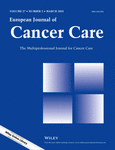Effects of nutritional support on short-term clinical outcomes and immune response in unresectable locally advanced oesophageal squamous cell carcinoma
Abstract
This retrospective study investigated the efficiency of nutritional support in unresectable locally advanced oesophageal squamous cell carcinoma (LAOSCC) patients who received concurrent chemoradiotherapy (CCRT) based on 5-fluorouracil and cisplatin. In the routine care group, 63 patients served as historical controls and received nutrition support in a reactive manner. In addition, 57 patients in the nutritional support group received timely diet counselling, oral nutritional supplements, enteral nutrition and/or parenteral nutrition during CCRT. This support was based on scores from nutritional risk screening 2002 (NRS-2002) after June 2014. The nutritional support group had significant advantages over the routine care group with respect to the incidence of neutropenia, the objective response rate, the change in serum albumin and the lengths of hospital stay. In addition, the nutritional support group had significantly higher levels of IgG and IL-2, higher proportions of NK, CD3+ and CD4+ cells as well as a higher ratio of CD4+/CD8+ cells than the routine care group (p < .05). In contrast, the nutritional support group had a significantly lower level of IL-6. In conclusion, the current nutritional care programme could bring benefits of improving treatment compliance, reducing toxicity and lengths of hospital stay and enhancing the immune response.




